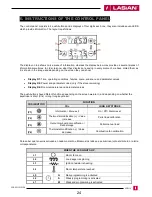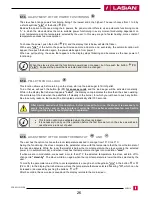
COD. 83119L.01EN
09//2016
12
4.1 CERTIFIED PELLET
On the market there are various types of pellet with quality and features that change depending on the kind of
production and type of wood materials used, but in this case the stove has been designed to exclusively operate
with DIN plus / ENplus A1 pellet, which guarantees the good performance of the stove.
DINplus is a voluntary brand issued by a third body that certifies the pellet produced and marketed respects the
requirements of the Austrian standard Önorm M 7135, one of the most demanding standards in the market.
Whereas, ENplus is a voluntary brand issued by a third body that certifies the pellet produced and marketed
respects the requirements of the standard EN 14961-2.
The requirements of dimensions and other properties required by these standards are shown in the following table:
Pellet dimensions according to EN 14961-2 and ÖNORM M 7135
Requirement
Unit
DINplus
ENplus A1
Diameter
*
mm
4
D < 10
D06 : 6
1
D08: 8
1
Length
*
mm
5 x D
3,15
L
40
Net calorific value
MJ/kg (w.b)
Q ≥ 18 (MJ/kg in d.b)
16,5
Q
19
Moisture
% (w.b)
10
Ash
% (d.b)
0,5
0,7
*
For stoves is only allowed:
Maximum diameter: 6 mm
Maximum length: 30 mm
Other diameters and lengths are valid for use in boilers.
4.2 WHAT DO YOU HAVE TO KNOW ABOUT THE PELLET
A certified pellet under any of the two previous standards (DIN plus / EN plus A1) would be the best guarantee for
the proper functioning of the stove, but still, there are pellets that meet and even exceed the requirements widely,
and others are at the limit the certification allows, so the stove will behave differently with a fuel and other.
Also keep in mind that throughout the heating season, consumption of pellet shoots up, especially in cold winters,
and fuel reserves can run out of pellet, so producers have to produce more with a wood than may not be like it was
in early winter, and even though you buy the pellet of the same brand and quality than the previous pellet, it does
not have the same characteristics.
Storage and handling of the pellet by the user, is also very important, because if it is not done properly, we can
vary the calorific characteristics (increase of moisture) and physical characteristics (increasing the proportion of
sawdust) of the fuel.
When a new batch of fuel is begun it is advisable to control the operation of the stove
(
check
paragraph
“4.3 USER SETTINGS DEPENDING ON THE PELLET THAT HAS BEEN USED”).
Fuel must be stored in a dry place and special attention must be paid to the handling of the
sacks in order to avoid grinding them and form sawdust.













































